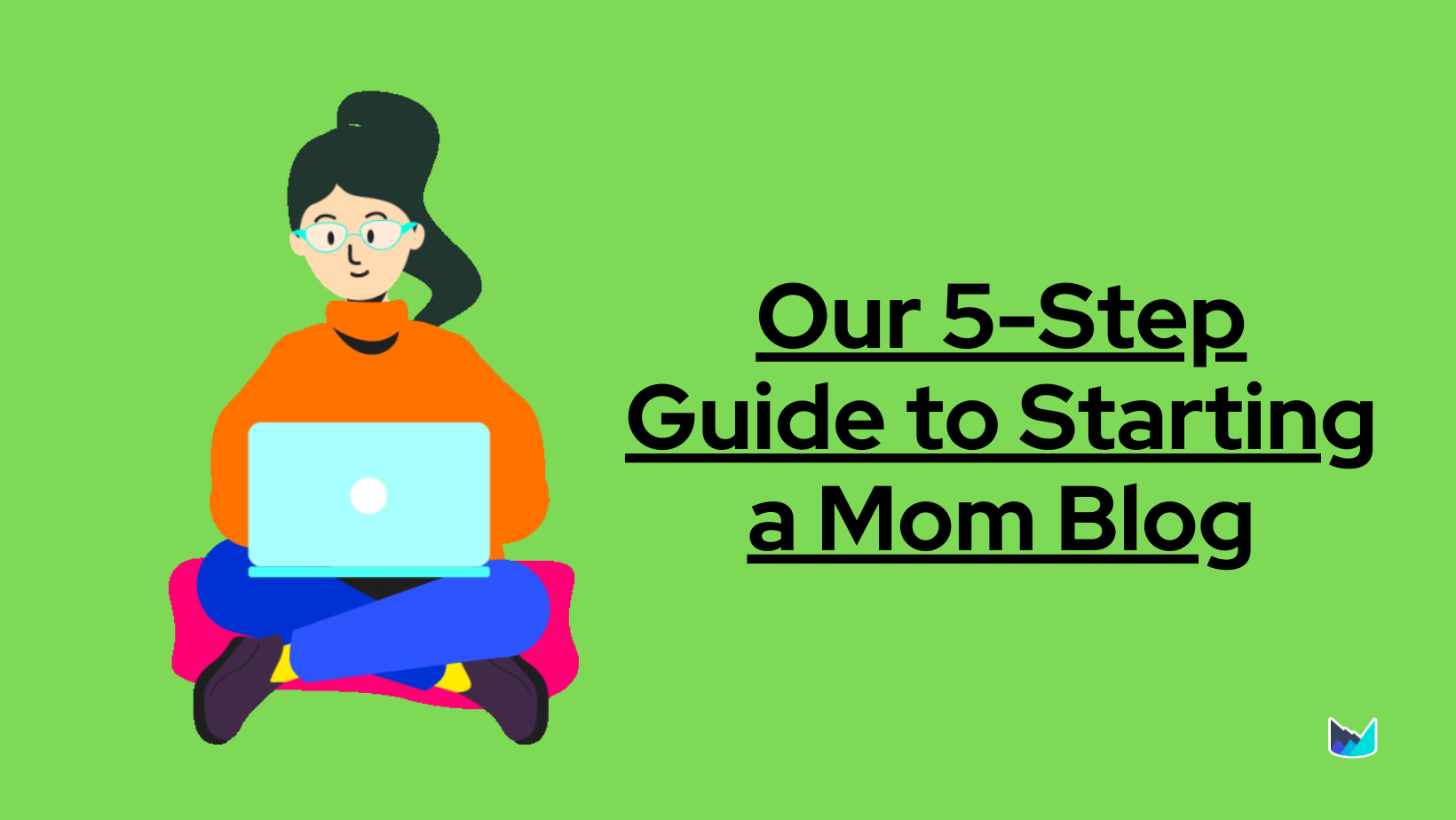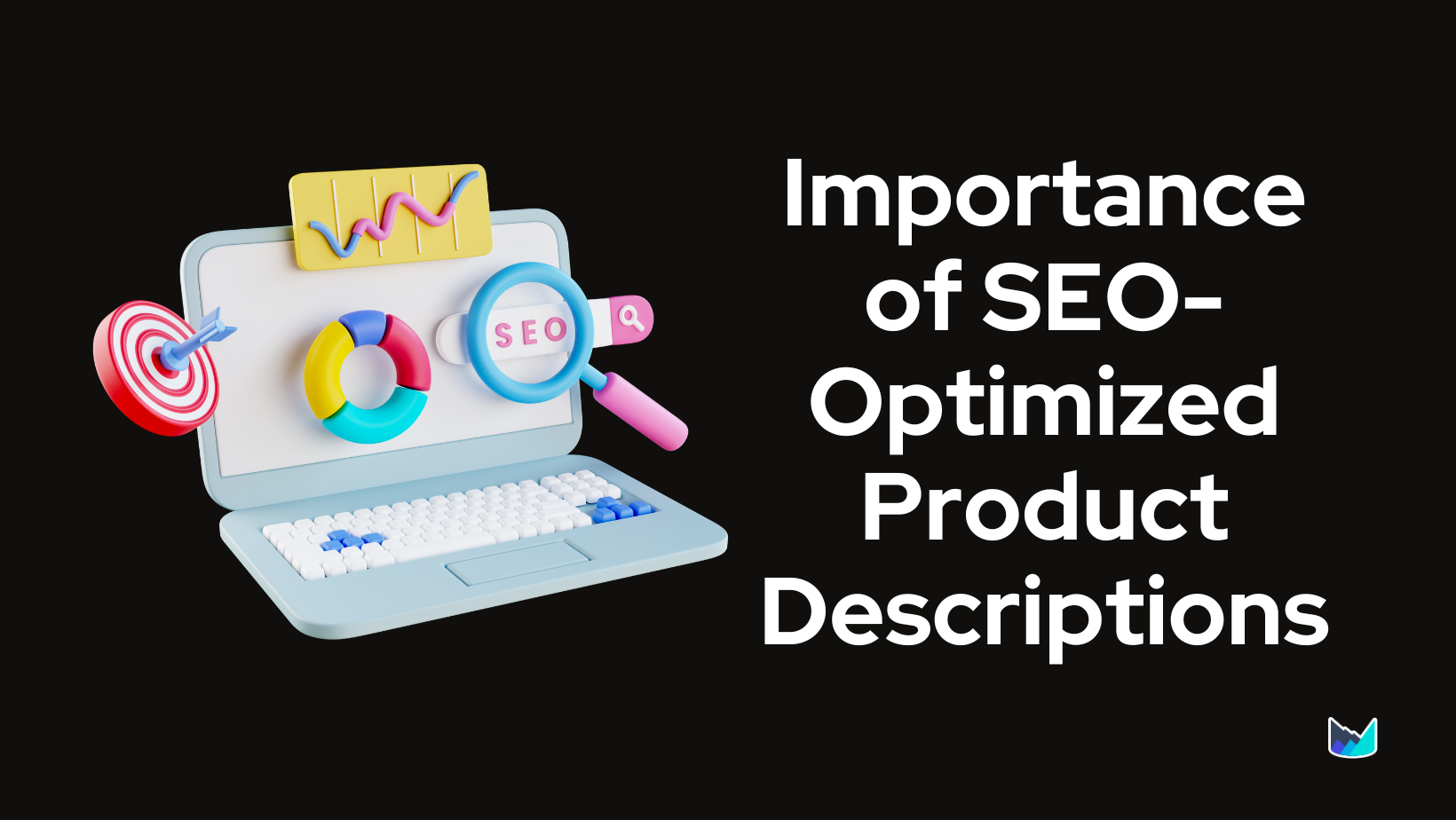- Product
- SEO Content Editor
- SEO Content Strategy
- Content Optimization
- Content Briefs
- AI Assisted Writing
- Keywords Clustering
Preview a demo walkthrough
Outranking the competition with our cutting-edge SEO strategies.
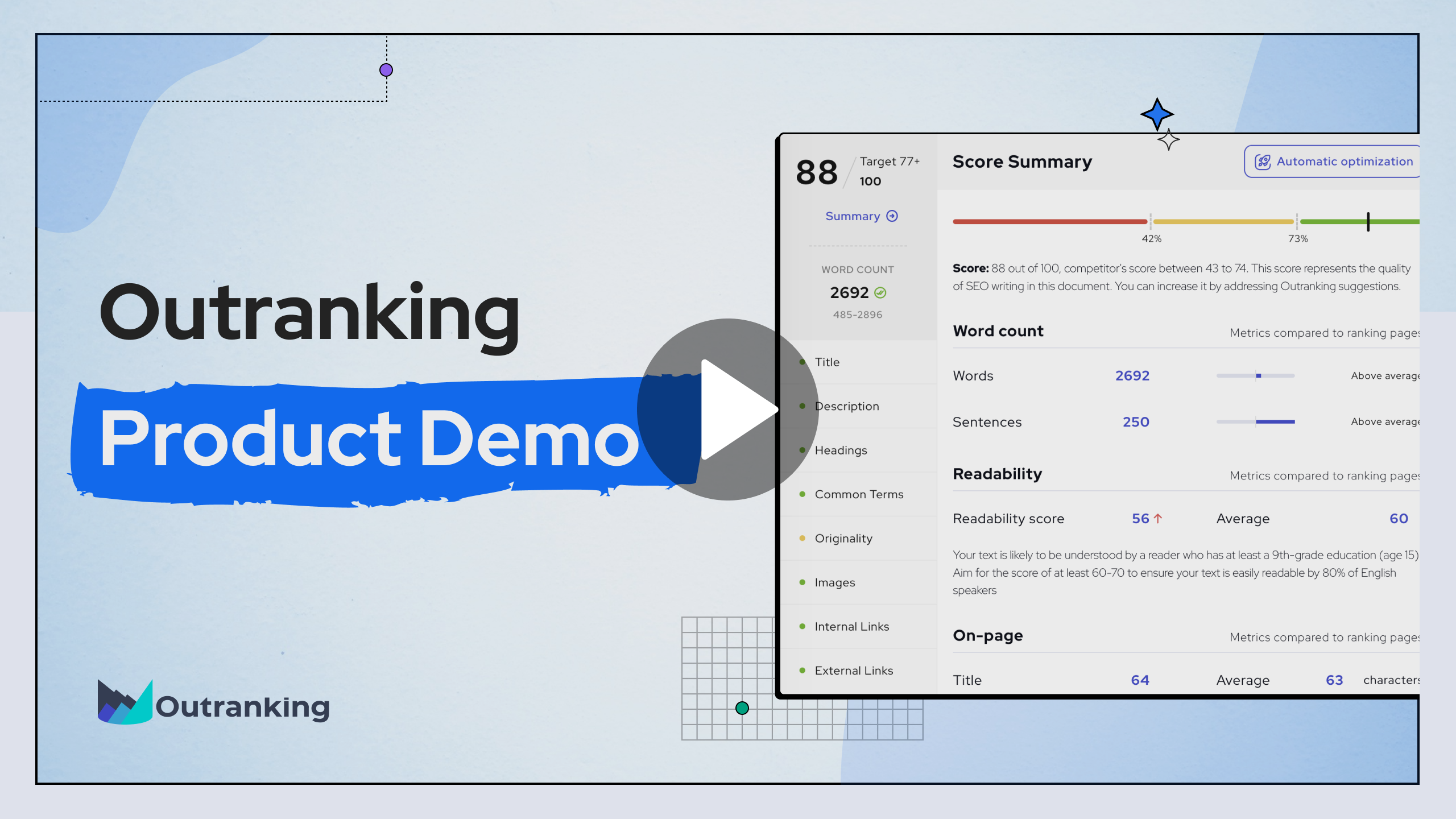
- Pricing
- Resources
- Sign In
- Get Started

How to Create Expert-Level Content by Leveraging Subject Matter Experts’ Knowledge
Table of Contents
Have you ever entered some of your target keywords on Google and found terrible content on the SERPs? Most of the time, this is good news because your competition hasn’t created relevant content to address that specific search intent.
However, in this article, I won’t explain how to create a content strategy. Specifically, I will try to answer how to create better blog content and how to improve content quality by leveraging the knowledge of subject matter experts (SMEs).
It doesn’t matter if you want to learn how to create blog content in a specific niche or how to create SEO content. This blog post includes a step-by-step guide to find, reach, and work with SMEs to create amazing content.
Below, you will find useful tips on how to create content for Instagram and how to create content for LinkedIn as well.
The process of finding, connecting, and working with SMEs to create amazing content is useful in many different contexts.
The challenge lies in the gap between SMEs and the general public. Sadly, research-based content tends to be hard to understand and can be discouraging for target readers.
In short, the dilemma is as follows:
SMEs have the knowledge, skills, and reputation needed to create top-quality content
However, SMEs are busy working for academia or senior-level corporate roles. Depending on their field of expertise, they often aren’t available or interested in being content creators. Furthermore, they’re used to creating content for high-profile technical and academic publications, so writing for a blog or a company’s website is rarely interesting for them.
Content creation experts have the skills, tools, and expertise to create content to address a wider non-technical audience
Moreover, content creation experts can use tactics to rank better in search engine results. However, content creation experts don’t have the authority to be a valid source for highly specialized topics.
There are many shortcuts and different ways to deal with this dilemma. The most straightforward way is to hire an SME as a content creator.
Obviously, this is out of reach for most companies, so the next-best solution available is to have a content creator with excellent research abilities.
On top of that, there is a very valuable tactic that is under-used by SEO content creators: reaching out to SMEs to find original, complete, and high-quality sources of data and information.
Is expertise important for SEO?
For decades, SEO experts have been trying to answer how to create great SEO content. It was just in 2018 that Google cleared the air when they published their Search Quality Rater Guidelines.
The document provides a useful set of guidelines on how to create good content for websites. Originally, Google created these guidelines to help their raters learn how to measure content quality.
It’s easy to understand why expertise is so important, particularly in crucial complex topics related to health and finance.
Since Google released their Search Quality Rater Guidelines in 2018, most SEOs started using E-A-T as an acronym for the most relevant ranking factors in terms of content:
- Expertise, or how knowledgeable and credible the author is
- Authority, or how your site compares with others, often measured as relevant links from other authoritative sites in your niche
- Trustworthiness, or how safe it is to use your site
So, in short, expertise is the most relevant aspect of SEO regarding content creation and vice versa. Moreover, human readers are the most important for SEO. Search engines are becoming smarter than ever but still aren’t as clever as your target reader.
Demonstrating expertise requires more than a respectable name, a nice picture, and a cool bio. Your readers would like more facts, data, evidence, and comments from other experts in the field.
So…
What if I am not a subject matter expert?
At the moment, it might seem that expertise isn’t too important for most people. However, it’s important to bear in mind that your target audience can discern experts from novices more easily than you think.
However, non-fiction writers, journalists, and most content creators can create a credible and respectable piece of content without being the top expert in their fields. How?
Newton said that he stood on the shoulders of giants to create world-changing scientific theories. Our job as content creators is humbler, so it’s easier to obtain support from the giants in our fields, so to speak.
I will show you how I found and contacted world-class experts in coffee and food science to write a food blog post about coffee freshness.
Finding SMEs in your field
Don’t overestimate what you find on the SERPs. If you want to rank higher, you can create better content.
And “better” means higher quality content, not just longer or fancier pages. The notorious Skyscraper technique became mainstream years ago. It’s crucial to understand its importance when it comes to expert content.
As Brian Dean put it, better can mean:
- More complete
- More up-to-date
- Better designed
- More detailed
In most niches, there are experts within reach that can help you obtain data, information, and insights that are considerably more up-to-date, detailed, and complete than content available on SERPs.
Using Google Scholar like a pro
To find SMEs, I run several queries with related keywords using Google Scholar. When I was doing research for my article about freshly ground coffee, I started looking for relevant articles on Google Scholar:

Recent studies are the best for finding experts, so you can filter for the last four years or less, depending on your niche.
Academic research tends to assess impact in terms of citations. So, I usually look for authors with highly cited articles.
Some results will provide full-text samples of the articles, which are nice if you want to have a deeper understanding of a specific study. However, this isn’t necessary to find your SME.
A few influential authors have their names underlined subtly, like Professor CF Ross. If you click a name, you’ll find an author profile, which helps you to better understand the field of expertise of the researcher, as well as their most influential and recent work:
Some experts in the science of coffee have long careers in chemical analytics, sensory analysis, or food science. In this regard, sometimes it’s better to order publications by date. Professor Chahan Yeretzian might be a good example of this since his published work in the early 1990s is still very influential.
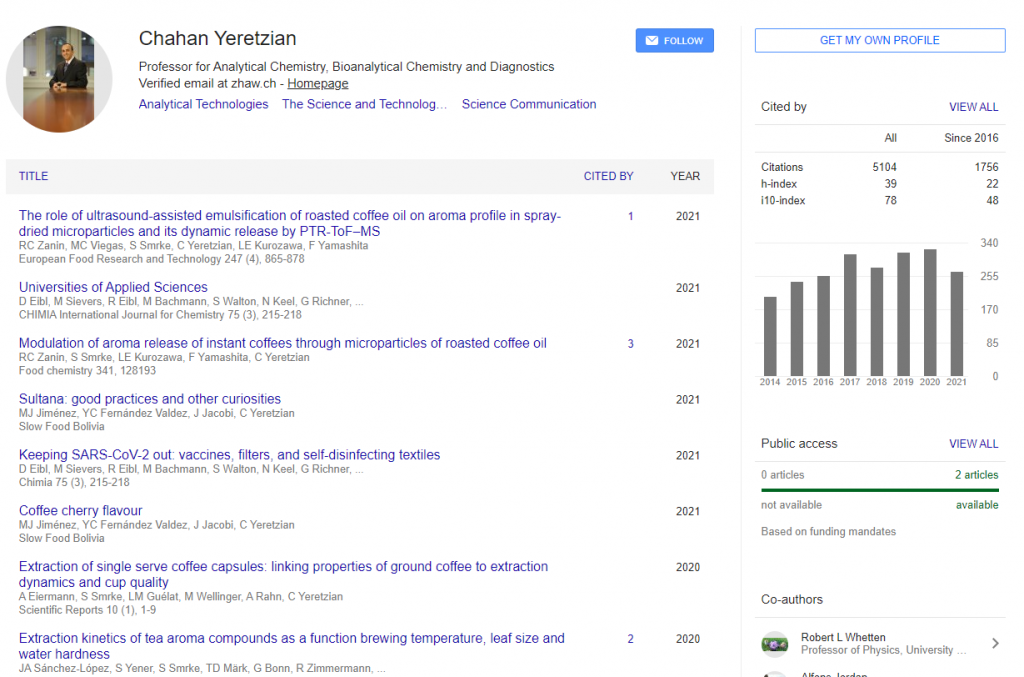
You can rinse and repeat this process as much as you want, but more than five authors is excessive. In my experience, contacting three to five authors can provide more than enough information and relevant insights.
I usually aim to reach five SMEs as a precaution. In any case, they aren’t obliged to answer my emails.
How to connect with experts
Experts use social media as much as we do, but I start with the contact information available in the Google Scholar profile. Most academic papers include the authors’ emails, indicating explicitly which author should receive correspondence regarding that specific project.
If Google Scholar doesn’t offer an author profile for an interesting SME for your article, I find it useful to use ResearchGate and LinkedIn too.
In the public profiles, you will find more interesting information about relevant SMEs, including links to their profile pages at the university or research center where they work.
With their emails and most relevant articles at hand, you can scan the most relevant insights and questions that you can address in your article to go much deeper than anything available on the SERPs.
If you have genuine questions that might be interesting for your readership, most SMEs will love to answer those too.
Writing emails to SMEs
Learning the jargon, burning questions in the field, and trends is important to establish a meaningful conversation with experts. It will help to engage and connect with them, instead of just exchanging information.
Usually, I greet SMEs respectfully, according to their positions at their respective institutions. Titles like Professor and Doctor are usual, and although most academics are friendly, I have never sent my first email in an informal tone. On the contrary, I start writing formal emails and get to a closer, more personal talk after I get my first “Hi.”
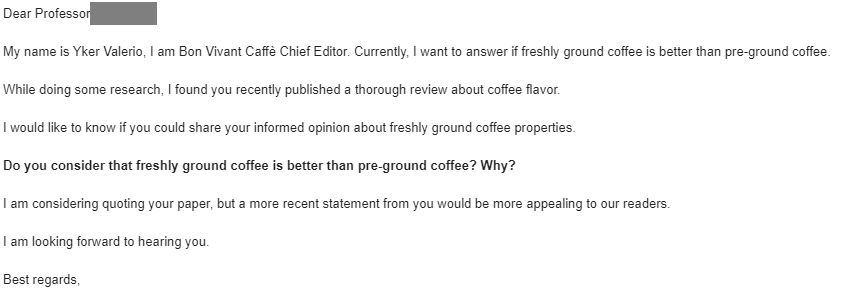
In some cases, I have enough time to conduct short interviews, and if you have an interesting in-depth blog post in mind, I totally recommend it.
Now, let’s go into a bit more detail about the process.
How to work with subject matter experts
In less than one hour, you should be writing your first email to one of your selected SMEs.
Depending on your approach, you can simply send a couple of questions in an email or ask for a short interview.
There are a few scenarios to consider:
- The SME is too busy, or something might stop them from answering your email.
- The SME is too busy to answer your specific question by email and sends you papers or relevant work instead, pointing you in the right direction.
- The SME answers your specific question and provides a nice answer you can quote or paraphrase in your blog post.
- The SME has time for a short interview before your deadline and agrees to a timeslot (in my experience, 30 minutes is enough).
For obvious reasons, the last two scenarios are ideal. However, the second scenario has worked perfectly for me in the past too.
Engaging with SMEs is intellectually challenging and enriching. Don’t feel discouraged by technical terms and the complex methods they use in their studies.
On the contrary, show a genuine interest to learn and demonstrate that you read their work. As a content creator, you will translate specialized work so a wider audience can grasp the SME’s insights and knowledge.
It’s important to acknowledge that, although the SME is helping you, you’re providing valuable visibility to their work too. Moreover, keeping this in mind while you work is crucial to creating more meaningful and engaging content.
Using Outranking.io, you can find relevant questions, topics, and keywords to discuss with your SME or even discover questions to ask.
In any case, try to find interesting topics to discuss that are related to their field of research, while keeping your readers’ goals in mind.
Research for content creation
Finding more and better information than what your competitors are providing is crucial. If you want to learn how to make content work, research is one of the keys to creating a more authoritative piece of content in your niche.
Usually, I do some research about the topic before reaching out to SMEs. However, after talking with them, I always feel more curious about the topic or want to get a deeper understanding of related subjects.
Research SERP data
Using SEO tools like Outranking, you can obtain interesting information about the SERPs. Learning about the length, backlinks, domain, and page authority is very useful to devise a research strategy to differentiate your content from the competition.
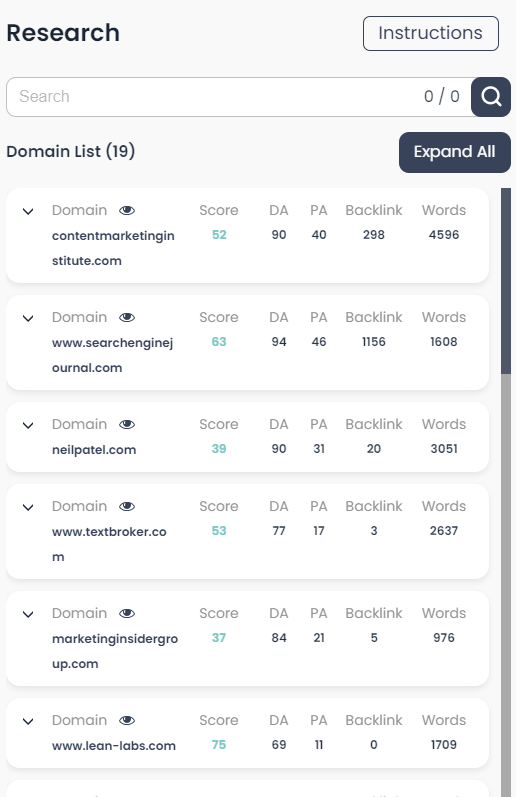
Scanning the meta descriptions from relevant blog posts, as well as reading or even scanning their outlines, can help you to understand the blind spots in their content.
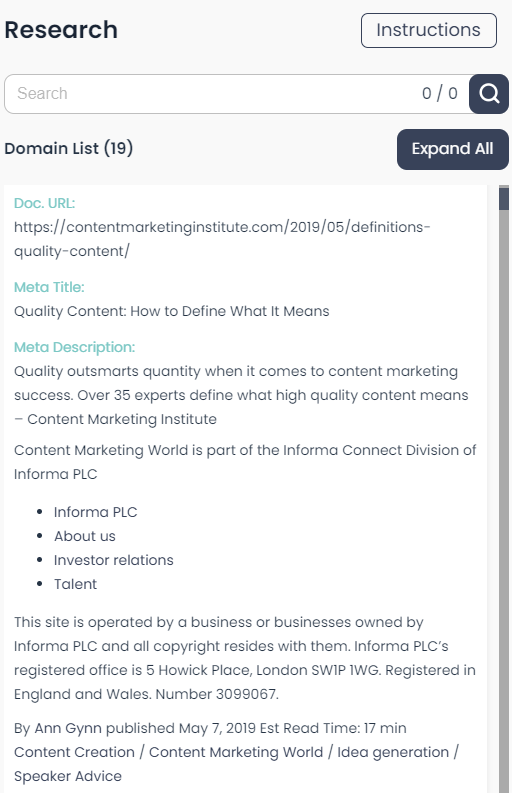
Usually, the common questions you find using Outranking can help you to understand which are already answered in the SERPs and which aren’t.
Save time and effort with massive open online courses (MOOCs)
Depending on your niche, you might know several influential pages you can read to get a better grasp of the topic. In some cases, if the field is too complex, I take a couple of introductory lessons in a MOOC, such as on Coursera or edX, to understand the principles, techniques, and concepts.
The good thing about MOOC lessons is that they are short and tend to be easy to understand. In practical terms, you can spend 15 minutes understanding complex and specialized topics instead of trying to process complex information from an academic paper.
YouTube is a great resource for quick fixes and solving problems at home, but it doesn’t offer the degree of academic rigor and quality that MOOC sites like edX and Coursera can.
Read paper abstracts

How many papers should you read? The answer depends on several factors, but in general, you won’t need to read entire papers to prepare a blog post. Moreover, many academic papers aren’t freely available to the public and need to be purchased.
If you really want to read a full paper, you can check ResearchGate, which many academics use to publish manuscripts before they’re peer-reviewed. Additionally, you can ask SMEs for references you can read in more depth, as they better understand the research landscape and can save you hours by sharing a couple of links.
In the abstracts, focus on the results of the study and the pending questions that arose from them.
Learn about study results and methods
In some cases, the description of a study might be interesting for your readers. Because of this, writing a simpler story about the experiment or the overall method can be helpful.
Many undergraduate courses do this to help students understand complex topics, and you can borrow this approach from them.
I have used it successfully to teach, as well as to show interesting findings to my readers.
However, as the famous non-fiction writer Susan Orlean explained in her Skillshare course, you need to use technical information carefully. Nobody wants to lose readers because of overly technical language or excessive quotations.
Quoting and paraphrasing experts
It’s tempting to use quotations from your experts because that’s the easiest way to write. Expert quotations are credible, authoritative, and evidence-based. Most of the time, it’s the best-informed opinion you can get about a complex or even polemic topic.
However, paraphrasing is the best option most of the time, and it’s important to do this in a bullet-proof way. The best way is to rephrase what you understand about SMEs’ assertions while you interview them. In this way, you can ensure that you are fully understanding so that you can offer a clear picture to your readers.
If you’re familiar with the topic, the methods, and the analytics experts use, you’re less likely to misunderstand their work. So, it isn’t always necessary to ask, unless you have a genuine question or doubt.
How to create engaging content by working with experts
Academic writing has a very specific way to organize information, which subtracts most of the emotional appeal and passionate stories behind every study.
Creating engaging content based on SMEs’ complex insights isn’t impossible, but it can be quite challenging, depending on the topic.
Ann Gynn wrote an interesting article for CMI about the characteristics of engaging content. It’s an excellent read that happens to quote and paraphrase golden nuggets from content marketing experts.
In short, we could say that “engaging content informs, entertains, and adds value,” as Ann wrote. But, in terms of specific features, we could select a few:
Address the readers emotions
Don’t underestimate your readers. Stories about discovery, struggle, frustration, persistence, and overcoming adversity are part of the daily lives of most SMEs in any field of expertise.
From a food scientist visiting a coffee plantation in Africa after a severe drought to a zoologist tracking a dangerous virus, there are tons of stories that can appeal to the emotions of readers without being cheesy or manipulative.
Answer the readers’ questions
We look to the internet as ancient civilizations looked to their shamans. People are looking for answers, and most of the time the internet delivers.
However, the quality of the results isn’t always consistent or good. Asking SMEs’ before paraphrasing what is already on the SERPs can make a difference and offer answers to specific questions.
Show authenticity
Avoid excessively using quotes or sounding too technical. As Susan Orlean asserts, it’s better to express insights and valuable knowledge in your own words.
Authentic writing creates a more intimate reading experience, and your audience will value the gesture. Remember that being authentic is the opposite of being patronizing.
Tell a useful story close to the readers’ reality
Storytelling has been crucial for me to understand how to create engaging website content. As Lisa Cron explains in her book, Wired for Story, our brains crave stories because they offer solutions to possible scenarios.
Imagining ourselves as researchers solving a tough puzzle or using our wits to help the most vulnerable is engaging because we feel like the heroes of our own story.
The stories we read and listen to during our lives provide guidelines for acting appropriately in relevant circumstances.
Conclusion
Finding and connecting with SMEs is easier than ever. Many are willing to share their knowledge with a wider audience.
Content creators, on the other hand, have the skills to outline and produce easy-to-understand and engaging content.
Working together, we can address the needs of a larger audience, bridging the gap between SMEs and readers.
Hopefully, the next time a reader tries to find an answer on a search engine, they will find your high-quality content.

